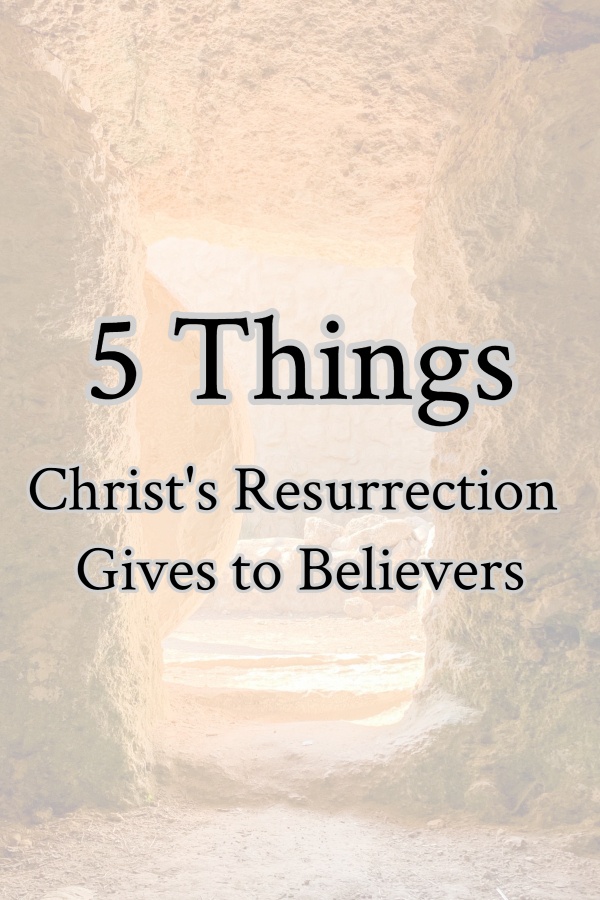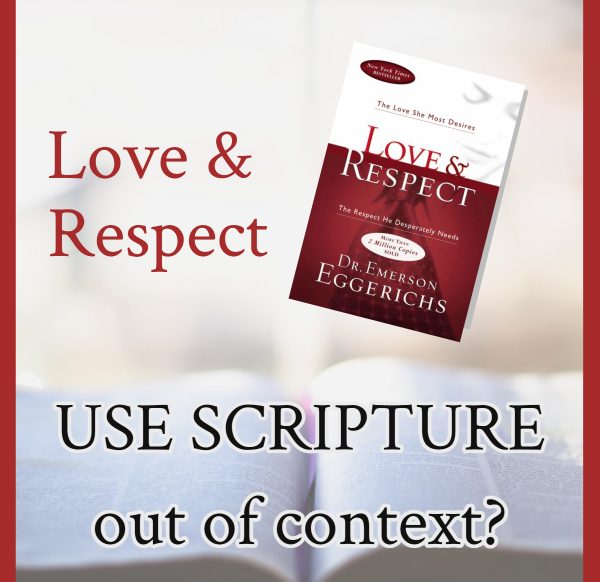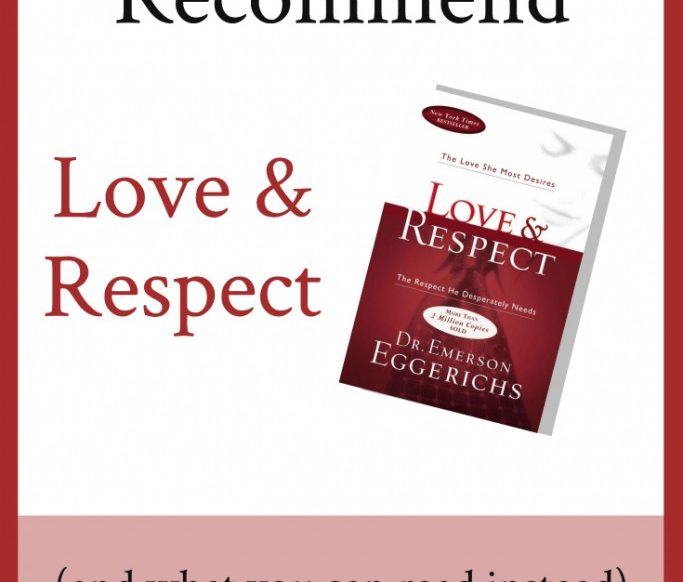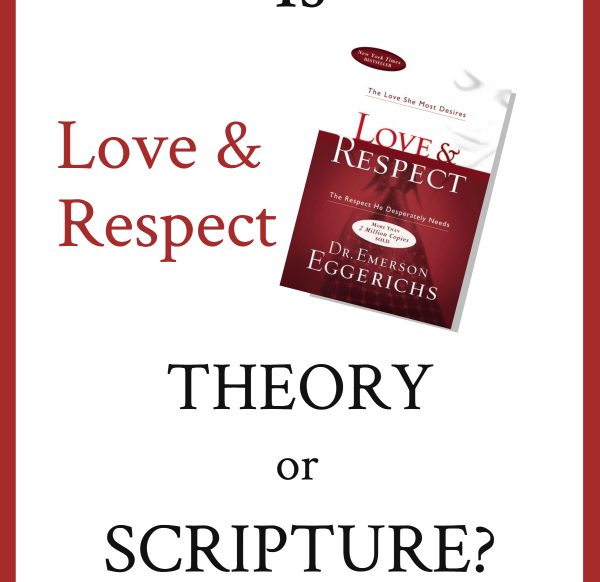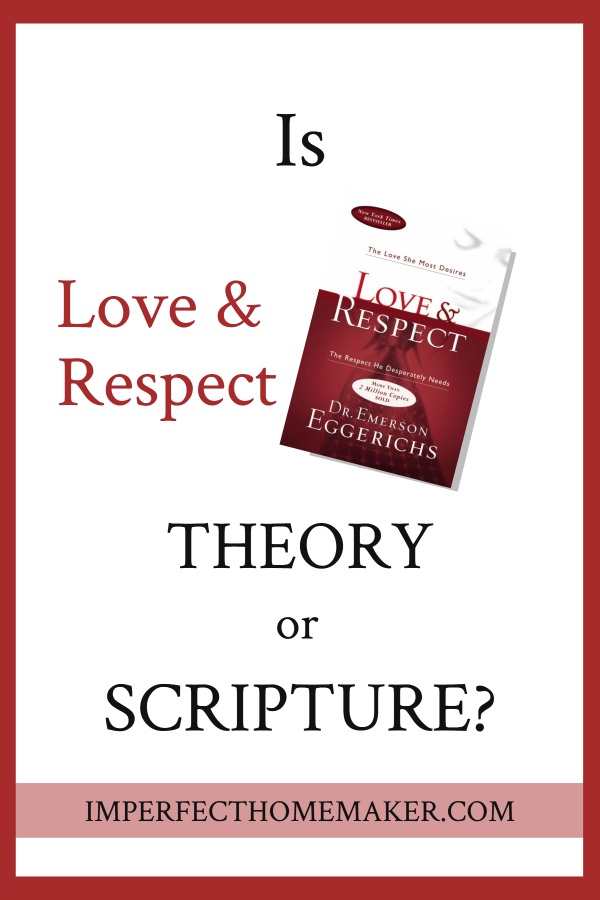This week on Instagram I asked a question about whether my followers had ever read a Christian marriage book that harmed them in some way or that they recognized might harm others with unbiblical messages. One of the books that came up was Love & Respect by Emerson Eggerichs.
This sparked a good deal of interest. Love & Respect is quite popular, and many people had never noticed a problem with it when they read it. They wanted to know more about what ways this book could possibly harm people because that had not been their experience.
Up until a few years ago, I had never personally read Love & Respect. But when I became an advocate for Christian victims of domestic abuse, I became aware that many victims had suffered greatly due to the concepts taught in this book. So when I saw it at a thrift store I picked it up so I could see what it said for myself.
I fired up my computer while I read it, and whenever I saw something that was unbiblical or that sent mixed messages, I copied that section and wrote down my thoughts about it.
I did not have to get very far through the book before I concluded that it was not something I would ever recommend. But I wanted to be completely fair and make sure I had read everything in complete context, so I finished the entire book, including all the appendices and endnotes.
Now that I have finished, I’ve been able to look at all the notes as a whole and see that the problems fall into a number of different categories, which I will share momentarily.
I worked hard in this process to give the benefit of the doubt and to try not to read something into the author's words that was not there. While many parts of this book are problematic at face value, other parts could probably be defended by saying that the problem only lies within the reader's interpretation of them. I have done my best to be honest about the difference between the two. Nevertheless, both scenarios are present within this book, and I want to make my readers aware of both avenues of potential harm.

My Heart Behind This Post
But first, I want to be clear here. I am not writing this article to “bash” a book or its author. I understand that many of you have read the book and been helped by it, and I am truly glad for that.
I wish nothing but the best for you, and if you implemented ideas from Love & Respect that had a positive effect on your marriage, then I rejoice with you.
But it is this same fact of wishing nothing but the best for people which leads me to write about why I cannot recommend Love & Respect. Though you may have had a positive experience with the book, not everyone has had that same experience. Many people have been greatly harmed by reading and applying this book’s ideas. There are a lot of mixed signals within the book, and each person will pick up the signals that most strongly relate to them. So while one person may understand something in a helpful way, many others will understand it in a harmful way.
I fully acknowledge that many people may find this book helpful, but I am not willing to sacrifice an entire group of people as collateral damage.
So if you are in the category of people who have benefited from reading the book, may I ask one thing? May I ask that you not read this article as an attack on you or on a book that you liked? Rather than an attack against anyone or anything, this is intended to be a defense for those who have been hurt.
I hold nothing against you for reading and liking Love & Respect. I don’t think you are a bad or ungodly person because you liked it or were helped by it. Truth be told, had I read this book in the past, I most likely would not have thought there was a problem with it either. I would have read it through the lens of my own experiences, and would have formed some variation of the following conclusion: “My husband and I love each other deeply. But sometimes we misunderstand each other, and when we try to understand where the other is coming from it will enhance our communication and thus our marriage. The end. That's a simple enough message, so where's the problem?”
However, as I became exposed to perspectives outside of my own, and as I became aware that a great many people had been harmed as a result of following this book's advice, I knew that I had to examine it closely to see why that was.
This article is the result of that examination.
So before we begin I want to assure you once again that this is not about me trying to bash a book that you personally enjoyed. This is about my being thankful that you received help from it while also loving those who did not. Thank you for your willingness to consider a different perspective.
There is no way for me to thoroughly explain the reasons I don't recommend Love & Respect in just one blog post, so this article will serve as the “home base”, so to speak, and I will elaborate on each reason in its own post.
Here is the list of reasons I don't recommend Love & Respect:
1. Love & Respect equates theory with Scripture.
Theories are not in and of themselves problematic when people are aware that they are simply a theory. When an idea is presented as a theory people can try it knowing that it may or may not help them, and they are free to use or discard the idea as needed.
But a theory presented as “Biblical, unchanging truth,” communicates to Christians that it must be followed without question.
When this “Biblical formula” does not solve their marital problems, they will either conclude that God got it wrong (which I don't think most Christians would do) or they will conclude that they must be doing it wrong and they must try harder or be more patient. This does a terrible disservice to husbands and wives who only desire to please God in their marriage, but are led to believe they must follow a certain formula to do that. Many spend far too long in abusive situations, believing that this formula, which has “everything“ to do with what kind of marriage they will have (p. 15) will fix their problems in due time.
Read this post for further clarification about how Love & Respect presents theory as Biblical truth.
2. Love & Respect makes some of its main points with out-of-context scripture.
Along with his theory that men’s primary need is respect and women’s is love, he presents supporting theories throughout the book about other ways that men and women are different. God made males and females, and I believe he created them distinct from each other on purpose. But the author takes this idea to an extreme and lays out intricate descriptions of how all men and all women are wired, and quotes scripture verses to support these descriptions. The understanding is that when a wife learns these unquestionable truths about how her husband is wired and acts accordingly, this will make him feel respected. And when a husband treats his wife according to how she is wired she will feel loved.
Without these fixed gender labels regarding what each gender’s deepest needs are and how each gender views the world, the book falls apart.
As I noted in the article about Love & Respect equating theory with scripture, it is not wrong for an author to present his theories. He could have even presented his gender labels as “many women need…” or “a lot of men feel that…” and he would not have been dishonest.
But to misuse scripture in order to present these gender labels as gospel truth, and to form an entire one-size-fits-all formula around them is misleading at best.
Even if I agree with much of what an author says, I am not okay with that author leading people to believe that his theories are Biblical truth when what he has actually done is to manipulate the scripture in order to make his points, especially when the results are disastrous. (Read the entire post here to see the effects this can have on people.)
3. Love & Respect is based on illogical assumptions about each gender's needs.
The author of Love & Respect uses circular reasoning and incomplete data to present gender-based assumptions about the ways husbands and wives should interact with one another. Instead of learning to interact authentically as unique individuals, spouses learn to alter their behavior to conform to a formula that has no firm Biblical or scientific foundation.
The result is that men and women with a destructive spouse suffer even further damage, and those with good-willed spouses learn to engage with their partner based on assumptions about them rather than on healthy communication.
(Numbers 4-11 will be updated and linked as I work my way through writing this series.)
4. Love & Respect does not define its foundational words.
5. Love & Respect encourages selfishness, manipulation and lack of personal responsibility.
6. Love & Respect absolves abusers and blames victims.
7. Love & Respect does not adequately address abuse.
8. Love & Respect presents serious marital problems as something easily fixed by a one-size-fits-all formula.
9. Love & Respect emphasizes behavior change over heart change.
10. Love & Respect presents an unhealthy and potentially dangerous view of sex in marriage.
11. Love & Respect can harm marriages even where neither spouse is abusive.
I know this list looks really terrible, and perhaps you wonder if I am intentionally wording it in a way that makes it look worse than it is.
I realize that if you were helped by this book, you didn't come away with the idea that you should accept abuse or that you had no personal responsibility for your own actions. Not every person who read the book is now focused on behavior change over heart change. To that I say, “Praise the Lord.” I am thankful that you have the humility and the sensitivity to the Holy Spirit never to find an excuse in something you read for selfishness and ungodliness on the part of yourself or your spouse.
However, the fact that these ideas are not what you got out of the book does not take away the fact that these ideas are actually in the book.
I have no control over who will take away any of the above ideas after reading Love & Respect, and because all of these ideas are either unbiblical or harmful I cannot recommend the book.
If you've already read it and didn't take away any harmful ideas, then why does this article matter to you now?
Many of you know others who have not read it yet but will encounter it. Perhaps their marriage is in crisis and their counselor recommended it to them. Or maybe their ladies group at church is planning to do a study on it.
Although you did not have a negative experience with the book, that is no guarantee that people you know and love will not.
You can make them aware of the problems within it so that they can either a.) choose to skip it or b.) be fully aware of the problems before they read it.
What do I recommend instead of Love & Respect?
Since I do not recommend Love & Respect, I thought it would only be fair to recommend some alternatives that one could read instead.
At the risk of sounding snarky and holier-than-thou, I will say that I believe the Bible is the best marriage book there is. As a husband and wife grow in their personal walk with Christ it affects every other aspect of their lives, including their marriage.
However, I certainly have no problem with reading other books as well. They can be a great source of practical ideas.
Communication and Working Through Conflict:
Boundaries
This original book will help you understand what is and is not your responsibility, how to communicate your needs with others, and how to listen when others communicate their needs to you.
Boundaries in Marriage
This book will go further in-depth into how the concept of boundaries works within a marriage. Boundaries are not at all about making anyone else do what you want, but are all about learning what is your responsibility and taking ownership of it.
For Struggles with Sexual Intimacy:
The Great Sex Rescue
This book aims to expose wrong ideas husbands and wives believe about sex and to re-frame them in a healthier way so that couples can enjoy passion, intimacy, and wholeness the way God intended.
For Spouses in Deep Emotional Pain
The Emotionally Destructive Marriage
There is a difference between a destructive marriage and a difficult one. If you are in constant emotional pain, this book will help you sort out the difference between the two. You will learn steps you can take to resolve the conflict with your spouse and what to do if they choose not to change.
It is important to note that no book is a cure-all, nor will it necessarily be a perfect fit for your situation. As we explored in the first point of this article, following the ideas in a book as if they are irrefutable truth can lead one to great harm. The reason I am comfortable recommending these books is that, unlike Love & Respect, they do not claim that their theories are “not just a nice little theory” and are “the key to any problem in a marriage”. However, even when a book does not claim to be absolute truth, it is important to remind oneself not to read it as such.
I hope this article has spurred your thinking and has encouraged you to see the value of those who have been hurt by Love & Respect, not because your own experience is invalid, but because theirs is valid too.
